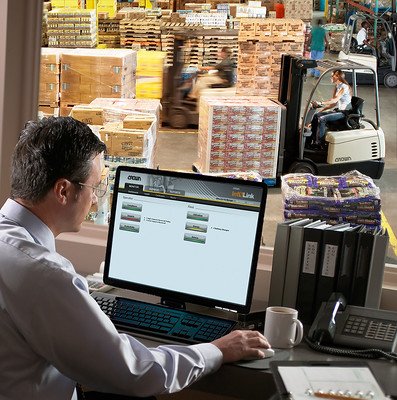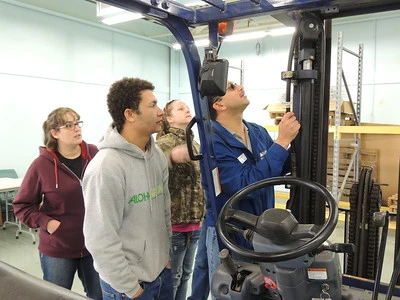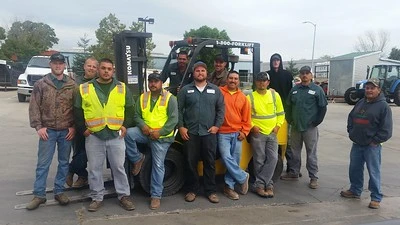Will an Employer Accept an Online Forklift Certification?
May 13, 2024 | by onlineoshasafetytraining.com


Yes, many employers will accept an online forklift certification, but it really depends on the employer and the type of job. Here’s why:
- It’s convenient:
- Online forklift certification courses offer a lot of flexibility. You can usually take these courses at any time that suits you, which is great if you’re currently working or have other commitments. Additionally, online courses tend to be less expensive than traditional, in-person training sessions. This makes them an attractive option for both individuals and companies looking to train their employees without breaking the bank.
- Check the fine print:
- Not all online forklift certifications are created equal. Employers will scrutinize these certifications to ensure they meet industry standards. Key aspects they look for include whether the course complies with safety regulations set by organizations like OSHA (Occupational Safety and Health Administration) in the U.S. They also check if the program covers all necessary topics like safety protocols, operational techniques, and maintenance knowledge. A well-recognized certification reassures employers that the candidate has received training that adheres to safety and operational standards.
- Not all are equal:
- While online courses are great for theoretical knowledge, forklift operation is a hands-on skill. Some employers may hesitate to hire someone who has only completed an online course because they lack practical experience. In industries where precision and safety are critical, employers may require additional proof of skill, such as a practical test or a supplementary in-person training session. Therefore, while an online certification can be a good start, it might need to be complemented with real-world experience to meet some employers’ standards.
- Ask around:
- Before investing time and money into an online forklift certification, it’s wise to do some research. Check with potential employers in your desired industry or area to see if they accept online certifications. You can also look at job postings to see what requirements are listed. Some postings may specify the type of certification needed, including whether online certificates are acceptable. This proactive approach can save you from taking a course that won’t help you get the job you want.
OSHA Does Recognize Online Certification
OSHA does recognize online forklift certification, but with an important condition: the training must be complemented by hands-on evaluation. Here’s how it works in simple terms:

- Online Learning: You can learn the theoretical part of forklift operation through an online course. This includes safety rules, proper operation techniques, and understanding the different types of forklifts.
- Practical Evaluation: After you complete the online portion, OSHA requires a practical, hands-on evaluation to ensure you can safely operate a forklift. This part cannot be done online and must be conducted by a qualified trainer who can observe and assess your ability to operate the equipment properly in a real-world environment.
So, while you can start your certification process online, it needs to be finished with actual driving under supervision to fully meet OSHA’s standards. This combination ensures that you not only know the rules and concepts but also can apply them safely.
Inquire With The Employer If Your Certification Can Be Accepted
If you’re applying for a job and you’re not sure if your online forklift certification will be accepted, it’s a good idea to check directly with the employer. Here’s a simple way to go about it:
- Be upfront:
- It’s important to be honest and clear about where you received your certification right from the start. During your job application or interview, mention that you obtained a forklift certification through an online course. This transparency helps set the right expectations and shows that you’re straightforward in your communications. You should also be prepared to explain what the online course covered, focusing on the safety protocols and operational knowledge you gained.
- Ask for specifics:

- Different companies might have different policies about online certifications. Some might fully accept them, while others might require additional proof of competence. Directly ask the hiring manager or your interviewer specific questions like: “I completed an online certification for forklift operation. Does your company accept this, or is there an additional verification process I should complete?” This will help you understand exactly what’s needed to qualify for the role and avoid any surprises later on.
- Provide details:
- Be ready to provide detailed information about your online forklift certification course. This could include the name of the institution or platform that offered the course, the topics covered during the training, and any assessments you completed. If your certification is endorsed by recognizable standards or organizations, mention this as well. This information can help reassure the employer of the quality and comprehensiveness of your training.
- Offer to demonstrate:
- Offering to demonstrate your forklift operating skills is a proactive move. It can be particularly persuasive if the employer is hesitant about the practical aspects of your online training. Propose a practical test or a trial period during which you can prove your ability to operate a forklift safely and effectively. This not only shows your confidence in your skills but also your willingness to adapt to the employer’s standards and processes.
Asking these questions not only clarifies the company’s stance but also shows your proactive attitude and commitment to safety and compliance. This can be a plus point for you as a candidate.
The Employer Can Refuse To Accept Online Forklift Certification
An employer might refuse to accept an online forklift certification in several situations, primarily revolving around concerns about the comprehensiveness of the training and its alignment with specific workplace requirements. Here are some common scenarios where this might occur:
- Lack of Hands-On Training:
- Forklift operation is highly skill-based and requires practical experience. If an online course offers only theoretical knowledge without any hands-on training, employers might deem it insufficient. Many employers consider the practical ability to operate a forklift safely under varying conditions crucial, something that purely online training may not sufficiently provide.

- Non-Accredited or Unrecognized Program:
- Employers may refuse certifications from online programs that are not accredited or recognized by reputable safety organizations. Accreditation ensures that the training meets certain standards and quality. If an online program lacks proper accreditation or is not recognized by industry-standard bodies, employers might question its validity and effectiveness.
- Specific Company Policies or Regulatory Requirements:
- Some companies have strict policies that require employees to undergo training that includes both theoretical and practical assessments administered directly by certified trainers. Additionally, certain industries or jurisdictions may have legal or regulatory requirements that online programs do not fulfill.
- Safety Record and Liability Concerns:
- Employers may also be concerned about safety records and liability. If a workplace has stringent safety protocols or has experienced accidents in the past, they might prefer more rigorous training methods than those provided by some online courses. Employers want to minimize the risk of accidents, which can lead to injuries and legal liabilities, by ensuring all operators are adequately trained.
- Insufficient Course Content:
- If the curriculum of an online forklift certification course does not cover all the necessary topics required by the employer or the industry standards, such as specific types of forklifts, advanced operational techniques, or certain safety protocols, the employer may not accept the certification.
In any of these cases, an employer might require additional training or assessment or might prefer certifications obtained through in-person training programs. It’s important for individuals to research and understand the specific requirements of their target jobs and to be prepared to meet these standards, potentially through additional training.
If You Get Accepted, You Might Get Additional Site-Specific Training
If you’re accepted for a job with an online forklift certification, it’s quite common for employers to provide additional, site-specific training. This type of training is tailored to the particular workplace environment and equipment you’ll be using, ensuring you can operate safely and efficiently within that specific setting. Here’s what typically happens:
- Understanding the Workplace Layout:
- Site-specific training helps you become familiar with the specific layout of the workplace. This includes learning the locations of loading docks, storage areas, pedestrian pathways, and any unique hazards or obstacles that you might encounter while operating a forklift in that environment.

- Equipment Familiarization:
- Even if you’re certified, the actual equipment used on a job site can vary. Different models of forklifts can have different controls, capabilities, and handling characteristics. Site-specific training ensures you understand how to operate the specific types of forklifts used at the site, including any special attachments or features they might have.
- Safety Protocols:
- Every workplace has its own set of safety protocols. Site-specific training covers these in detail, including emergency procedures, reporting accidents, and handling hazardous materials, if applicable. This training is crucial for maintaining safety standards and ensuring you know how to react in emergency situations.
- Compliance with Local Regulations:
- Depending on the location, there might be local regulations that affect how forklifts should be operated. Site-specific training includes instruction on these regulations to ensure that all operations are compliant with local laws and standards.
- Performance Standards:
- Employers may also use site-specific training to set performance standards and expectations. This helps ensure that all forklift operators work efficiently and consistently, meeting the productivity and safety standards of the company.
Site-specific training is an essential part of integrating into a new work environment and complements your existing certification by adapting your skills to the specific requirements and conditions of your new job. It not only enhances safety but also improves your confidence and effectiveness as a forklift operator.
Other Training The Employer May Provide
After getting accepted for a forklift job, employers often provide several types of training to ensure that operators are fully prepared for their specific roles and responsibilities. These trainings are essential not only for compliance with safety regulations but also for enhancing productivity and ensuring a safe working environment. Here are some common additional trainings that an employer might provide:
- Refresher Courses:
- Even experienced operators might be required to take refresher courses periodically. These courses ensure that operators stay up to date with the latest safety regulations, forklift technology, and best practices in operation.
- Advanced Operational Techniques:
- For operators who may need to handle complex tasks, training in advanced operational techniques could be provided. This includes working with high-lift operations, handling unusual loads, or operating in challenging environments like cold storage or hazardous material areas.
- Maintenance and Repair Training:
- Understanding basic maintenance and troubleshooting for forklifts can be crucial. Employers might offer training on daily maintenance checks, minor repairs, or troubleshooting common issues. This training helps reduce downtime and ensures that the equipment is always in good working condition.
- Safety Leadership Training:
- For those in supervisory roles or with long-term career prospects at the company, safety leadership training might be offered. This focuses on developing skills to lead by example, promote a culture of safety, and ensure that team members adhere to all safety protocols.
- Emergency Response Training:
- This training covers procedures for handling emergencies, such as spills, equipment failures, or accidents. Learning how to effectively respond to such situations is critical for minimizing injury and damage.
- Communication and Teamwork Skills:
- Effective communication and teamwork are essential in environments where multiple operators are working in close proximity. Training might focus on improving these skills to enhance coordination and reduce the risk of accidents.
- Certification in Other Equipment:
- If the job requires, training might also be provided for operating other types of machinery or equipment, such as pallet jacks, cranes, or specialized industrial vehicles.
- Regulatory Compliance Training:
- Specific training related to regulatory compliance might be necessary, especially if the workplace involves special hazards. This training ensures that all operations are in line with legal and industry standards.
Employers invest in these trainings not only to comply with legal requirements but also to enhance the efficiency and safety of their operations. This comprehensive approach to training helps build a proficient and safety-conscious workforce.
To Make a Conclusion
Whether an employer will accept an online forklift certification depends on a few things. If the online course covers all the right topics and follows safety standards, many employers will think it’s okay. But remember, just learning from a computer might not be enough. Most times, you’ll also need to show you can actually handle a forklift in real life. So, it’s a good idea to check with the job you’re aiming for to see what they need. Doing this can save you time and make sure you’re on the right track to getting the job with your online certification.
RELATED POSTS
View all


